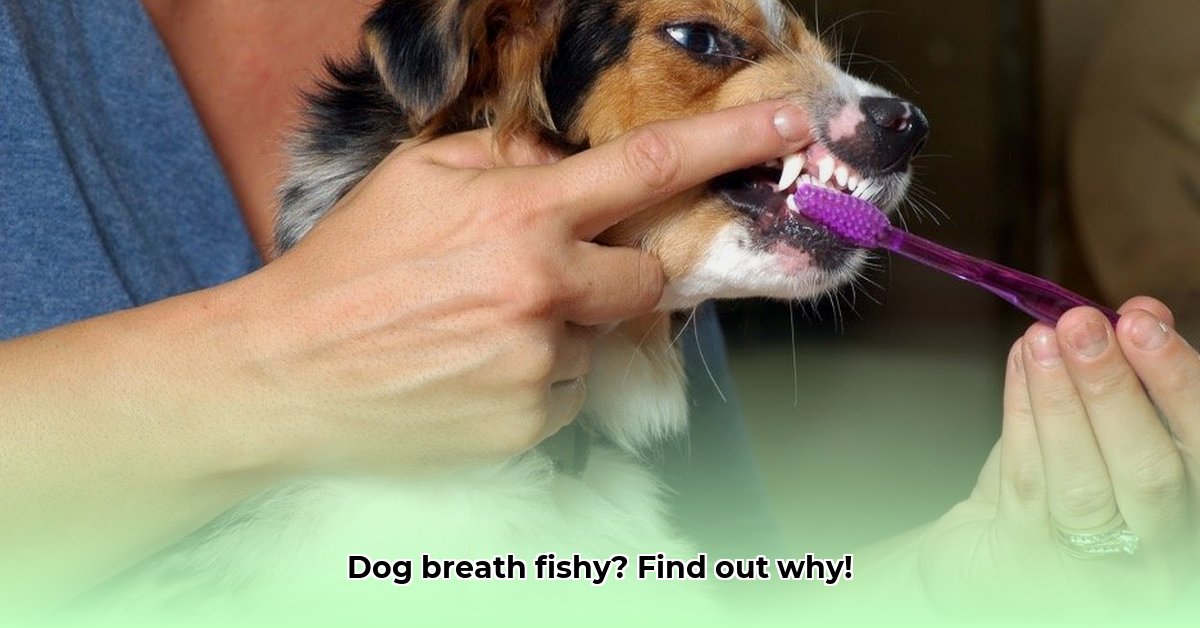Noticing a fishy smell coming from your dog’s breath? It’s a common concern and often a sign that something needs attention. This article will help you understand why your dog’s breath smells like fish, from dental problems to more serious health issues, emphasizing the importance of veterinary consultation. For more in-depth information, check out this helpful resource: Dog Breath Smells Like Fish.
Dogs Breath Smells Like Fish: Unraveling the Mystery and Finding Solutions
A fishy scent in your dog’s breath isn’t just unpleasant; it could signal a hidden health issue that requires a veterinary visit. Ignoring it could lead to bigger problems down the line. Let’s explore the potential causes behind this unusual aroma and what you can do to tackle the causes of bad breath in dogs and maintain optimal oral hygiene.
The Usual Suspects: Decoding Why Your Dog’s Breath Smells Fishy?
Several factors can cause that distinct fishy smell. Let’s explore the most common culprits responsible for a dog’s bad breath:
- Dental Disaster: The Importance of Oral Health: Plaque and tartar build-up can lead to gingivitis (inflamed gums) and periodontal disease (gum and tooth infections), resulting in a fishy smell with varying intensity. Neglecting dental hygiene in dogs, just like in humans, can lead to serious complications and potentially require tooth extraction.
- Kidney Woes: Impact on Breath Odor: Kidney disease can surprisingly cause a fishy breath odor. When kidneys don’t filter waste products properly, these products can build up and be released through the breath. Other symptoms of kidney disease includes increased thirst and urination, decreased appetite, and lethargy.
- Liver Troubles: Organ-Related Odor: Liver problems can also lead to a fishy breath, sometimes mixed with a sweet or musty smell. Like with kidney disease, the liver’s inability to process waste properly results in the release of these substances through the breath. Other potential signs of liver issues include weight loss, jaundice (yellowing of the skin and eyes), and vomiting.
- Diabetes: Metabolic Imbalance: In diabetic dogs, the body struggles to use sugar effectively, leading to breath with a sweet smell, occasionally with a faint fishy undertone. Increased thirst and urination are common signs of diabetes, along with weight loss, increased appetite, and lethargy.
- Dietary Discrepancies: A diet rich in fish might temporarily affect breath odor. Similarly, consuming unusual items could also result in a temporary fishy smell. However, persistent fishy breath is unlikely to be solely diet-related, according to veterinary experts.
Decoding the Clues: How is Fishy Breath Diagnosed?
If your dog’s breath consistently smells fishy, a visit to your veterinarian is essential. According to the American Animal Hospital Association (AAHA), early detection is crucial for effective treatment. They’ll employ several methods to determine the underlying cause:
- A Thorough Oral Exam: Your vet will carefully examine your dog’s mouth, checking for plaque, tartar buildup, gum inflammation (gingivitis), and any other dental problems to rule out dental disease.
- Blood Tests: Blood work provides valuable information about kidney and liver function and helps pinpoint whether diabetes is a possibility and identify other medical conditions.
- Urinalysis: A urinalysis assesses kidney function and can identify other potential medical issues through a urine sample.
Veterinarians may use additional tests depending on their initial findings and suspicions.
Treatment & Prevention: Steps to a Fresher Breath for Your Dog
Treatment depends entirely on the underlying cause. Dental issues might require professional cleaning, sometimes involving tooth extractions. Medical conditions necessitate specific veterinary-prescribed treatments and ongoing monitoring. Here are some vital proactive steps you can take to support your dog’s oral and overall health, for a better preventative oral care:
- Daily Dental Duty: Make brushing your dog’s teeth a daily habit using a dog-specific toothbrush and toothpaste. This helps prevent plaque buildup and maintain healthy gums.
- High-Quality Eats: A nutritious, well-balanced diet is crucial for overall health, including oral health. Consult your vet about the best food for your dog’s needs to avoid a variety of dental issues.
- Dental Chew Delights (vet-approved only): Some veterinary-approved dental chews can help remove plaque and keep teeth clean, supporting overall oral hygiene. Always choose options specifically designed for dogs to avoid potential safety hazards.
- Regular Vet Checkups: Schedule regular veterinary checkups to enable early detection of any problems, including dental issues or more serious health concerns and ensure early treatment.
Don’t rely on internet home remedies, as they are not a replacement for professional veterinary care.
Final Thoughts: Partnering with Your Vet for Your Dog’s Health
Fishy breath shouldn’t be ignored. Prompt action, guided by your veterinarian, can prevent more significant problems and ensure your canine companion enjoys a long, healthy life. Remember, early diagnosis and responsible management significantly improve your dog’s quality of life. Your vet is your partner in this process, providing the expertise needed to ensure your furry friend thrives and tackles causes of bad breath.
How to distinguish fishy dog breath caused by kidney disease vs. dental issues
Key Takeaways:
- Fishy breath in dogs often points to underlying health problems, like other systemic illnesses, rather than just being about fish-flavored treats.
- Poor dental hygiene is a major culprit, but serious illnesses like kidney disease can also cause this odor.
- Distinguishing fishy dog breath caused by kidney disease vs. dental issues requires a vet’s expertise, as a physical exam is needed.
- Proactive dental care at home can significantly help prevent many issues, but is not a replacement for a vet.
Dental Diseases: The Usual Suspects for Dog Bad Breath
That fishy smell is often a sign of dental trouble like plaque buildup, gingivitis (gum inflammation), and periodontal disease (infection of the tissues supporting teeth). Bacteria flourish in this environment, producing volatile sulfur compounds which are the culprits behind that unpleasant odor. Periodontal disease can lead to pain, tooth loss, and even systemic infections. Regular brushing with pet-safe toothpaste is crucial, however dental chews can help, but they’re not a replacement for professional cleaning.
Medical Conditions: Unseen Threats
Sometimes, fishy breath signals a more serious problem relating to systemic illnesses. Kidney disease is a common cause, where the kidneys falter and can’t effectively filter waste products. These toxins, including urea, can build up in the bloodstream and eventually affect the breath. You might also notice increased thirst, frequent urination, and lethargy. Liver disease and diabetes also have similar effects on breath, sometimes in conjunction with more pronounced symptoms.
Dietary Factors and Other Odors that Result in Dog Bad Breath
While a fish-based diet might contribute to a fishy smell, it’s rarely the sole explanation. Many other substances can cause unusual breath odors. Have you noticed your dog scavenging in the trash? Ingesting non-food items, like rotting material, can result in awful breath. Veterinary internal medicine specialists highlight the importance of considering dietary habits as potential contributing factors.
How to Distinguish the Causes: The Vet’s Role
A vet’s examination is vital for determining the origin of fishy breath. They’ll assess your dog’s overall health, examine its mouth, and likely recommend diagnostics. Blood tests (for kidney and liver function in order to rule out systemic diseases), urinalysis (detecting metabolic byproducts), and a thorough dental checkup are common procedures. This allows us to decide if it’s a simple dental problem or something more complex.
Diagnosing the origin of the fishy breath is crucial. A simple dental cleaning may resolve mild cases, while serious conditions demand targeted treatment, possibly including medication and lifestyle changes.
Proactive Measures: Home Care and Prevention for Fishy Dog Breath
Proactive dental care is paramount. Brush your dog’s teeth daily, making sure to use pet-safe toothpaste. Offer dental chews, but remember they don’t replace brushing. Choose high-quality dog food that promotes optimal oral and overall health, as well as regular veterinary checkups, at least annually, that are key for early detection.
Understanding Fishy Dog Breath in Senior Canines
Key Takeaways:
- Fishy breath in dogs isn’t always a cause for panic, but it warrants attention, especially in senior dogs to rule out systemic illnesses.
- Poor dental hygiene is a major culprit and lead to dental disease, often the cause in senior dogs.
- Underlying medical conditions like kidney or liver disease can also manifest as fishy breath, as well as diabetes.
- Proactive dental care and a healthy diet are essential for prevention.
The Mystery of the Fishy Smell in Senior Canines
Have you noticed a fishy odor from your senior dog’s mouth? It’s a common concern that can range from a minor annoyance to a sign of a serious health issue. While a fishy smell might sometimes stem from diet, it frequently points to something more significant. Let’s explore the possible causes to solve the mystery of a senior dog’s fishy breath.
Dental Diseases: The Usual Suspects in Senior Dogs’ Bad Breath
The most frequent cause of fishy breath is dental disease. As dogs age, plaque and tartar accumulate on their teeth, leading to gingivitis (gum inflammation) and periodontal disease, so taking them for a veterinarian appointment is very important. These conditions create an environment ripe for bacteria to thrive, resulting in the release of that distinctive fishy odor
- Glass Lid Storage Containers Keep Food Fresh and Safe - January 19, 2026
- Borosilicate Glass Storage Delivers Durability and Safety for Meals - January 18, 2026
- Best Meal Prep Containers for Fresh and Organized Meals - January 18, 2026










